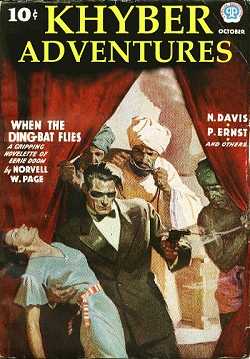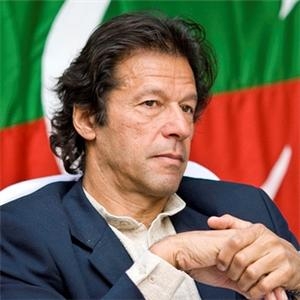 Pakistain's lack of realism
Pakistain's lack of realismColumnist Nazeer Naji wrote in Jang that Pakistain's condition for opening the NATO
...the North Atlantic Treaty Organization. Originally it was a mutual defense pact directed against an expansionist Soviet Union. In later years it evolved into a mechanism for picking the American pocket while criticizing the cut of the American pants...
supply route was unrealistic when it asked for $5000 per truck when for the past decade it was accepting $250 per truck from NATO. In the past much damage was done to the infrastructure by these trucks for which Pakistain unfairly agreed to receive very little, but now to enhance the fee 20 times was not justified.
Dr Afridi to be used as a pawn?
Columnist Ishtiaq Beg wrote in Jang that Dr Shakeel Afridi was punished in the Khyber Agency
 with 33 years in jail for spying for the US - which led to the discovery and death the late Osama bin Laden
with 33 years in jail for spying for the US - which led to the discovery and death the late Osama bin Laden... who has made the transition back to dust...
- under tribal law because he could be freed later by the simple device of Governor Khyber-Pakhtunkhwa
... formerly NWFP, still Terrorism Central...
pardoning him. Thus Dr Afridi could become a pawn in the bargain that Pakistain would drive with the US on the Afghan endgame.
| It occurs to me that these are not nice people. |
Reported in Jang 67 percent of the Paks favoured free trade with India while 29 percent opposed it. About 45 percent thought that trade will help normalise bilateral relations. Some 37 percent thought that cricket too could help in improving the equation.
| If only the army and government of Pakistan cared about the wishes of the voters... |
Daily Jang reported that Dr Afridi was not only ghadaar (traitor) to Pakistain he was also a drunkard (sharabi), pleasure-loving (ayyaash), bribe-taker (raashi), and incompetent (na-ehel) person who also slept around with women.
| How very odd, when he was so unobjectionable until the army's pet terror mastermind was taken by the Americans. |
Daily Jang reported that the circular debt of Rs 300 billion left behind by the Musharraf government was now Rs 400 billion which had aggravated the situation of non-payment to the independent power producers (IPPs) which provide most of the electricity in Pakistain. The eight IPPs have invoked sovereign guarantees because of non-payment.
Power production harder than atom bomb
Daily Express had lawyer Fawwad Chaudhry saying that making and exploding the atom bomb was easier than producing electricity because the priorities of the state were opposed to looking after the people and more focused on fighting wars.
| As it is said, Pakistan is an army with a country attached. |
| Of course. He's too dumb to realize they'll be running things behind his back, and so are his voters. |

... aka
Taliban Khan, who who convinced himself that playing cricket qualified him to lead a nuclear-armed nation with severe personality problems...
because they wanted him to be Pakistain's next prime minister. Lahore, Bloody Karachi
...formerly the capital of Pakistain, now merely its most important port and financial center. It may be the largest city in the world, with a population of 18 million, most of whom hate each other and many of whom are armed and dangerous...
and Islamabad were the venues for this movement of the army officers while Lahore Gymkhana was their gathering place in Lahore. The officers said that the Army was not behind Imran Khan but the gatherings clearly pointed to that possibility.
Mukhtaran Mai complains judiciary
Woman raped under orders from an illegal rural panchayat Mukhtaran Mai was quoted in Express as saying that she was not given justice by the superior judiciary because a judge thought that she could not have been raped on grounds that the FIR was recorded late. She said that she wanted to die after the gang-rape. General Musharraf who had attributed her plaint to an effort to get a visa to the US said if the judiciary decided against her then the judges must be right.
Ban convert marriage for six months
Daily Express reported that the Commission on Minorities Affairs had recommended to the government that any non-Mohammedan converting to Islam should be prevented from marrying for six months. It also recommended that the chairman of the Evacuee Property Trust should be chosen from the non-Mohammedans because the evacuee property belonged to non-Mohammedans.
The Columnist and Dr AQ Khan
Writing in Express famous columnist Abdul Qadir Hasan stated that he loved Dr AQ Khan above all because he had made Pakistain secure by exploding the atom bomb. But pygmy politicians are after him to exploit him for political purposes. He wrote that he left a good job because he loved AQ Khan and had a public tiff with General Zia over the great nuclear scientist.
| That's nice, dear. Would you like a biscuit with your tea before bed? |
Writing in Jang Hamid Mir stated that the entire world was scandalised by the ongoing feud between the PPP government and the Supreme Court. The government was openly in defiance of the Court's orders while some state agencies were getting out of hand in Balochistan

...the Pak province bordering Kandahar and Uruzgun provinces in Afghanistan and Sistan Baluchistan in Iran. Its native Baloch propulation is being displaced by Pashtuns and Punjabis and they aren't happy about it...
. Military-dominated agency the ANF was getting excessive in its action against the pharmaceutical industry where four million people were employed forcing the factories to relocate to Bangladesh.
'Chaalbaz' Shah Mehmood
Writing in Express Nusrat Javeed stated that Pak diplomat was great because he was opposed to letting the UN inquire into the liquidation of Benazir Bhutto
... 11th Prime Minister of Pakistain in two non-consecutive terms from 1988 until 1990 and 1993 until 1996. She was the daughter of Zulfikar Ali Bhutto, founder of the Pakistain People's Party, who was murdered at the instigation of General Ayub Khan. She was murdered in her turn by person or persons unknown while campaigning in late 2007. Suspects include, to note just a few, Baitullah Mehsud, General Pervez Musharraf, the ISI, al-Qaeda in Pakistain, and her husband, Asif Ali Zardari, who shows remarkably little curiosity about who done her in...
but later on when it did take place against his wishes foreign minister Shah
 Mehmood
Mehmood WormtongueQureshi used his tricks (chalakian) and deceptions (chaalbazian) to make the UN inquiry come to nothing.
| ...thus protecting the honour of the Land of the Pure. |
Famous head of Indus Basin Water Council Zahurul Hasan Daha told Nawa-e-Waqt in Islamabad that if India did not stop water aggression (aabi jarihiyat) then Pakistain will have to unleash nuclear war on it.
| Big talk from an unimportant little man. |
| I think that last might be us. I suspect it's an insult. |
Munir Akram and the Bomb
Columnist Nusrat Javeed wrote in Express that super Pak diplomat at the UN Munir Akram (retired) had written that first the Pak atom bomb was directed at India but now Pakistain should announce that it would be used against anyone daring to threaten Pakistain. Javeed asked what if the US threatened Pakistain as it had done at Salala? Would then Pakistain be bound to throw the atom bomb at the US?
| a good point, Mr. Javeed.More importantly, what would happen if Pakistan tried? |
Famous columnist Muhammad Ahmad Sabswari wrote in Jang that in the Constitution Section 251(1) it was pledged that the national language of Pakistain was Urdu and would be enforced in 14 years in public offices. It also pledged that English would be used as official language after arrangements for it had been made. But 24 years had passed without progress on Urdu. Now the bad news was that 22 MNAs had prepared a bill which enumerated the regional languages of the country as national languages and they will be given time to be enforced and till such time English will continue to be used. Switzerland
...home of the Helvetians, famous for cheese, watches, yodeling, and William Tell...
and Canada had more than one national language.
| Evoke the djinns! Pakistan must be made Swiss! |
Famous columnist Hamid Mir stated in Jang that the Baloch were with Ahmad Shah Abdali when he attacked India in 1761. They were 25,000 in number and took part in the carnage. In 1765 Baloch hero Mir Nasir battled the Sikhs. In 1769 they went to war with Iran. But the British came and made them fight one another. The Baloch were always with Mohammedans of Pakistain.
| That was then. Now they know better. |
















 A shadowy group calling itself "
A shadowy group calling itself " ISLAMABAD: Pakistan on Thursday rejected an Afghan minister's request that the names of Pakistani missiles be changed because they coincided with those of former Afghan rulers.
ISLAMABAD: Pakistan on Thursday rejected an Afghan minister's request that the names of Pakistani missiles be changed because they coincided with those of former Afghan rulers.